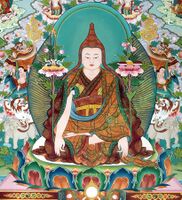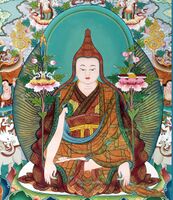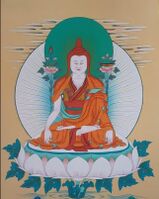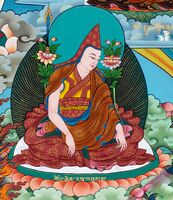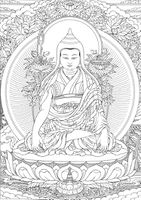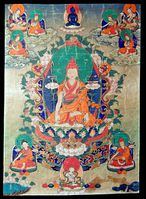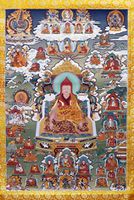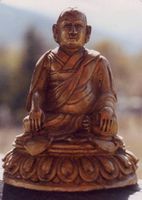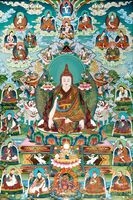Klong chen pa: Difference between revisions
No edit summary |
No edit summary |
||
| (3 intermediate revisions by one other user not shown) | |||
| Line 5: | Line 5: | ||
|MainNameWylie=klong chen rab 'byams | |MainNameWylie=klong chen rab 'byams | ||
|PersonType=Classical Tibetan Authors; Tertons | |PersonType=Classical Tibetan Authors; Tertons | ||
|bio=Also known as Klong chen pa (Longchenpa). An esteemed master and scholar of the Rnying ma sect of Tibetan Buddhism known especially for his promulgation of | |bio=Also known as Klong chen pa (Longchenpa). An esteemed master and scholar of the Rnying ma sect of Tibetan Buddhism known especially for his promulgation of rdzogs chen. Klong chen pa is believed to be the direct reincarnation of Padma las 'brel rtsal, who revealed the ''Rdzogs chen snying thig'', and also of Padma gsal, who first received those teachings from the Indian master Padmasambhava. Born in the central region of G.yo ru (Yoru), he received ordination at the age of twelve. At nineteen, he entered Gsang phu ne'u thog monastery where he engaged in a wide range of studies, including philosophy, numerous systems of sūtra and tantra, and the traditional Buddhist sciences, including grammar and poetics. Having trained under masters as diverse as the abbots of Gsang phu ne'u thog and the third Karma pa, Rang 'byung rdo rje, he achieved great scholarly mastery of numerous traditions, including the Rnying ma, Sa skya, and Bka' brgyud sects. However, Klong chen pa quickly became disillusioned at the arrogance and pretention of many scholars of his day, and in his mid-twenties gave up the monastery to pursue the life of a wandering ascetic. At twenty-nine, he met the great yogin Kumārarāja at Bsam yas monastery, who accepted him as a disciple and transmitted the three classes of rdzogs chen (rdzogs chen sde gsum), a corpus of materials that would become a fundamental part of Klong chen pa's later writings and teaching career . . . Among the most important and well-known works in Klong chen pa's extensive literary corpus are his redaction of the meditation and ritual manuals of the heart essence (Snying thig), composed mainly in the hermitage of Gangs ri thod dkar. Other important works include his exegesis on the theory and practice of rdzogs chen, such as the Mdzod bdun (“seven treasuries”) and the Ngal gso skor gsum (“Trilogy on Rest”). (Source: “Klong chen rab 'byams.” In ''The Princeton Dictionary of Buddhism'', 439. Princeton University Press, 2014. http://www.jstor.org/stable/j.ctt46n41q.27.) | ||
|images=File:KunkhyenLongchenRabjam.jpg | |images=File:Longchenpa (central).jpg | ||
File:KunkhyenLongchenRabjam.jpg | |||
File:Longchenpa.jpg | File:Longchenpa.jpg | ||
File:8710 (LongchenRabjam).jpg | |||
File:Longchenpa (R. Beer).jpg{{!}}Line Drawing by Robert Beer Courtesy of [http://www.tibetanart.com/ The Robert Beer Online Galleries] | File:Longchenpa (R. Beer).jpg{{!}}Line Drawing by Robert Beer Courtesy of [http://www.tibetanart.com/ The Robert Beer Online Galleries] | ||
File:Longchenpa 02.jpg{{!}}[http://www.himalayanart.org/items/90171 Himalayan Art Resources] | File:Longchenpa 02.jpg{{!}}[http://www.himalayanart.org/items/90171 Himalayan Art Resources] | ||
File:LongchenRabjam.jpg{{!}}[http://www.himalayanart.org/items/57033 Himalayan Art Resources] | File:LongchenRabjam.jpg{{!}}[http://www.himalayanart.org/items/57033 Himalayan Art Resources] | ||
File:Longchen rupa.jpg{{!}}"likeness" statue | File:Longchen rupa.jpg{{!}}"likeness" statue | ||
File:Longchenpa (Nyingthig Lineage).jpg | |||
|YearBirth=1308 | |YearBirth=1308 | ||
|YearDeath=1364 | |YearDeath=1364 | ||
Latest revision as of 13:43, 6 June 2024
| PersonType | Category:Classical Tibetan Authors Category:Tertons |
|---|---|
| MainNamePhon | Longchen Rabjam Drime Özer |
| MainNameTib | ཀློང་ཆེན་རབ་འབྱམས་ |
| MainNameWylie | klong chen rab 'byams |
| SortName | Longchenpa |
| TertonNameWylie | dri med 'od zer |
| TertonNameTib | དྲི་མེད་འོད་ཟེར་ |
| AltNamesTib | ཀློང་ཆེན་པ་ · ཀློང་ཆེན་རབ་འབྱམས་ · དྲི་མེད་འོད་ཟེར་ · ཀུན་མཁྱེན་ཀློང་ཆེན་རབ་འབྱམས་ · ཀློང་ཆེན་པ་དྲི་མེད་འོད་ཟེར་ |
| AltNamesWylie | klong chen pa · klong chen rab 'byams · dri med 'od zer · kun mkhyen klong chen rab 'byams · klong chen pa dri med 'od zer |
| AltNamesOther | Kunkhyen Longchen Rabjam · longchenpa · drime özer · Drimé Özer · Longchenpa Drime Wozer |
| bio | Also known as Klong chen pa (Longchenpa). An esteemed master and scholar of the Rnying ma sect of Tibetan Buddhism known especially for his promulgation of rdzogs chen. Klong chen pa is believed to be the direct reincarnation of Padma las 'brel rtsal, who revealed the Rdzogs chen snying thig, and also of Padma gsal, who first received those teachings from the Indian master Padmasambhava. Born in the central region of G.yo ru (Yoru), he received ordination at the age of twelve. At nineteen, he entered Gsang phu ne'u thog monastery where he engaged in a wide range of studies, including philosophy, numerous systems of sūtra and tantra, and the traditional Buddhist sciences, including grammar and poetics. Having trained under masters as diverse as the abbots of Gsang phu ne'u thog and the third Karma pa, Rang 'byung rdo rje, he achieved great scholarly mastery of numerous traditions, including the Rnying ma, Sa skya, and Bka' brgyud sects. However, Klong chen pa quickly became disillusioned at the arrogance and pretention of many scholars of his day, and in his mid-twenties gave up the monastery to pursue the life of a wandering ascetic. At twenty-nine, he met the great yogin Kumārarāja at Bsam yas monastery, who accepted him as a disciple and transmitted the three classes of rdzogs chen (rdzogs chen sde gsum), a corpus of materials that would become a fundamental part of Klong chen pa's later writings and teaching career . . . Among the most important and well-known works in Klong chen pa's extensive literary corpus are his redaction of the meditation and ritual manuals of the heart essence (Snying thig), composed mainly in the hermitage of Gangs ri thod dkar. Other important works include his exegesis on the theory and practice of rdzogs chen, such as the Mdzod bdun (“seven treasuries”) and the Ngal gso skor gsum (“Trilogy on Rest”). (Source: “Klong chen rab 'byams.” In The Princeton Dictionary of Buddhism, 439. Princeton University Press, 2014. http://www.jstor.org/stable/j.ctt46n41q.27.) |
| YearBirth | 1308 |
| YearDeath | 1364 |
| BornIn | g.yo ru |
| TibDateGender | Male |
| TibDateElement | Earth |
| TibDateAnimal | Monkey |
| TibDateRabjung | 5 |
| ReligiousAffiliation | Nyingma |
| EmanationOf | Vimalamitra · pad+ma las 'brel rtsal |
| Has emanations | Dudjom Terse Drime Özer · Lhatsun Namkha Jikme · Pema Lingpa · Pema Lodrö |
| StudentOf | rig 'dzin ku mA ra rA dza · Third Karmapa Rangjung Dorje · g.yag sde paN chen · bsod nams rgyal mtshan · Kyitön Drakpa Gyaltsen |
| BDRC | https://library.bdrc.io/show/bdr:P1583 |
| Treasury of Lives | http://www.treasuryoflives.org/biographies/view/Longchenpa-Drime-Ozer/P1583 |
| Himalayan Art Resources | http://www.himalayanart.org/search/set.cfm?setID=309&searchObjectType=all |
| IsInGyatsa | Yes |
| GyatsaNameTib | གཏེར་སྟོན་དྲི་མེད་འོད་ཟེར་ |
| GyatsaNameWylie | gter ston dri med 'od zer |
| GyatsaBioStartPage | 436 |
| GyatsaBioEndPage | 468 |
| GyatsaBioStartFolio | 52a5 |
| GyatsaBioEndFolio | 64b4 |
| GyatsaBioTib | ས་ཧོར་དུར་ས་དབུས་གཙང་ཀུན་ལ་འབེབས༔ མཆོད་རྟེན་འོག་ནས་ཐོད་པ་ཁྱི་ཡིས་གཡེང༔ བསམ་ཡས་མཆིམས་ཕུར་སྦས་པའི་གཏེར་ཁ་འདི༔ མི་བཞག་འདོན་པའི་རྟགས་དེ་བསྟན་ནས་འབྱུང༔ གཏེར་སྟོན་དྲི་མེད་འོད་ཟེར་ཞེས་བྱ་འབྱུང༔ ཞེས་པའི་གཏེར་སྟོན་དྲི་མེད་འོད་ཟེར་ནི། དོན་དམ་པར་སློབ་དཔོན་བི་མ་ལའི་སྙིང་ཏིག་གི་བསྟན་པ་ཡིད་དཔྱོད་དང་འདྲེས་པའི་སྐབས་ལོ་བརྒྱ་བརྒྱ་ན་བི་མ་ལའི་སྤྲུལ་པ་རེ་འབྱོན་པར་གསུངས་པ་དང་། སྒྲ་ཐལ་འགྱུར་ཆེན་པོའི་རྒྱུད་ལས། དེ་རྗེས་བློ་གྲོས་མཆོག་གིས་འཛིན། །ཞེས་གསལ་བར་ལུང་བསྟན་པ་ལྟར་པཎ་ཆེན་དྲི་མེད་བཤེས་གཉེན་གྱི་རྣམ་འཕྲུལ་དུ་གྲུབ་ནའང་དགོས་པའི་དབང་གིས་རྒྱལ་པོའི་ལྷ་ལྕམ་པདྨ་གསལ་གྱི་སྐྱེ་མཐའ་སྤྲུལ་པའི་སྐུ་པདྨ་ལས་འབྲེལ་རྩལ་གྱི་གཏེར་ལུང་དུ། དེ་རྗེས་ལོངས་སྐུའི་ཞིང་ཁམས་དར་གཅིག་ཉུལ་བར་གསུངས་པ་ཀུན་མཁྱེན་ཆེན་པོ་འདི་ཉིད་དུ་ངེས་པས། དེས་ན་ལས་འབྲེལ་གྱི་སྐྱེ་བ་དེ་མ་ཐག་པའོ། །འཁྲུངས་ཡུལ་གཡོ་རུ་གྲ་ནང་གི་སའི་ཐིག་ལེ་སྟོད་གྲོང་དུ་ངན་ལམ་བཙན་པོ་འོད་ཀྱི་དཀྱིལ་འཁོར་ཅན་ཞེས་བྱ་བ་སློབ་དཔོན་རྒྱལ་བ་མཆོག་དབྱངས་དང་རུས་གཅིག་པའི་གདུང་རབས་ཉེར་ལྔ་པ། མེས་པོ་ལྷ་སྲུང་ཞེས་བདུད་རྩིའི་བཅུད་ལེན་གྲུབ་པ་དེའི་སྲས་སློབ་དཔོན་བསྟན་སྲུང་ཞེས་རིག་པའི་གནས་དང་སྔགས་ཀྱི་རྣལ་འབྱོར་ལ་རང་བྱན་ཆུད་པ་དེས། ཡུམ་འབྲོམ་བཟའ་མ་བསོད་ནམས་རྒྱན་མ་བདག་གིར་བཞེས་པའི་སྲས་སུ་སྐྱེ་བའི་མྱུ་གུ་བཟུང་། རབ་བྱུང་ལྔ་པའི་ཕུར་བུ་ས་སྤྲེལ་དབོ་ཟླ་བའི་ཚེས་བཅུར། ཞིང་གི་ཉེ་ལོགས་ན་ཁ་ཞིག་ཏུ་སྐུ་འཁྲུངས། གསུང་བྱེ་བ་ཙམ་ནས་སྐྱེས་བུ་དམ་པའི་རིགས་གསལ་བར་སད། ལོ་ལྔ་ནས་འབྲི་ཀློག་བརྡའ་བསྟན་པ་ཙམ་གྱིས་མཁྱེན། ལོ་བདུན་པ་ནས་ཡབ་ལ་མངའ་བདག་པའི་བླ་མ་ཞི་དྲག །བཀའ་བརྒྱད་བདེ་འདུས་སོགས་ཀྱི་དབང་ལུང་མན་ངག་ཕྱག་བཞེས་བཅས་པ་དང་། སྨན་རྩིས་སོགས་ཀྱང་གསན་ཅིང་ཀུན་ཆུབ་པར་མཛད། བཅུ་གཉིས་པ་ལ་བསམ་ཡས་སུ་མཁན་པོ་བསམ་འགྲུབ་རིན་ཆེན་དང་སློབ་དཔོན་ཀུན་དགའ་འོད་ཟེར་ལས་རབ་ཏུ་བྱུང་བའི་མཚན་ཚུལ་ཁྲིམས་བློ་གྲོས་སུ་གསོལ། འདུལ་བ་ལ་སྦྱངས་ཤིང་བཤད་གསར་མཛད་པས་མཁས་པའི་སྙན་གྲགས་ཐོབ། བཅུ་དགུ་པ་ལ་གསང་ཕུ་ནེའུ་ཐོག་ཏུ་སློབ་དཔོན་བཙན་དགོན་པ་དང་ཁྱད་པར་བླ་བྲང་པ་ཆོས་དཔལ་རྒྱལ་མཚན་དང་གཞོན་ནུ་རིན་ཆེན་གཉིས་ལས་ཕར་ཚད་ཀྱི་གཞུང་འགྲེལ་གསན་ཅིང་མཐའ་དག་བྱང་ཆུབ། སློབ་དཔོན་གཞོན་ནུ་རྒྱལ་པོ་ལས་དབུ་མ་རྩ་འཇུག་སོགས་དང་། དཔང་ལོ་ཆེན་པོ་ལས་མངོན་པ་གོང་འོག་དང་ཏིང་ངེ་འཛིན་རྒྱལ་པོ་སོགས་ཟབ་མོ་མདོ་ལྔའི་བཤད་པ། སྙན་ངག་སོགས་ཐ་སྙད་ཀྱི་གཙུག་ལག་རྣམས་གསན་ཅིང་ཁོང་དུ་ཆུད་ནས་ལུང་རིགས་སྨྲ་བའི་སྡེ་རྣམས་སུ་གྲ་སྐོར་མཛད་པས་སྤོབས་པ་བསམ་གྱིས་མི་ཁྱབ་པས་བསམ་ཡས་པ་ལུང་མང་པོ་ཞེས་སྙན་པར་གྲགས། དེ་དག་གི་སྔ་ཕྱི་ཅི་རིགས་པར་འབྲས་སྤུངས་དན་འབག་གི་ཆོས་གྲྭར་སློབ་དཔོན་གཞོན་ནུ་དོན་གྲུབ་ལས་མདོ་སྒྱུ་སེམས་གསུམ། གསང་འདུས་སྤྱོད་རྒྱུད་སོགས་ཀྱི་དབང་ཁྲིད་བཤད་བཀའ། སློབ་དཔོན་བཀྲ་ཤིས་རིན་ཆེན་ལས་བདེ་མཆོག །ལམ་འབྲས་སྦྱོར་དྲུག་ཞི་བྱེད། རྫོགས་ཆེན་སེམས་ཕྱོགས་སྐོར། གཞོན་ནུ་རྡོ་རྗེ་ལས་བཀའ་གདམས་སྐོར། མཐིང་མ་བ་གྲགས་འོད་ལས་བཀའ་བརྒྱད་བདེ་འདུས་སོགས་ཟབ་གཏེར་གྱི་སྐོར་མང་པོ། གཞན་ཡང་རྒྱལ་དབང་རང་བྱུང་རྡོ་རྗེ། ས་སྐྱ་པ་བླ་མ་བསོད་ནམས་རྒྱལ་མཚན་སོགས་ཡོངས་འཛིན་ཉི་ཤུ་ལྷག་ཙམ་ལས་དུས་དེར་བོད་ཡུལ་དུ་གྲགས་པའི་མདོ་སྔགས་མན་ངག་དང་བཅས་པ་ཕལ་ཆེར་གསན་ཅིང་། རྩིས་སོགས་ཐ་སྙད་ཤེས་བྱའི་ཆོས་ཚུལ་མཐའ་དག་ལ་མཁས་པར་མཛད། མི་གཡོ་བ། དབྱངས་ཅན་མ། ཕག་མོ་དཀར་མོ་སོ་སོར་བསྒྲུབས་པས་བློ་གྲོས་ཀྱི་མཐུ་ཆེན་པོ་གྲུབ་པའི་ཚུལ་བསྟན། རྗེ་བཙུན་སྒྲོལ་མས་རྟག་ཏུ་བྱིན་གྱིས་བརླབས་ཤིང་དངོས་གྲུབ་སྩོལ་བའི་དབུགས་དབྱུང་ཐོབ། ཁྱད་པར་དགུང་ལོ་ཉེར་བདུན་པར་ཡི་དམ་ལྷས་ལུང་བསྟན་པ་ལྟར་རིག་འཛིན་ཆེན་པོ་ཀུ་མཱ་ར་ཛའི་སྤྱན་སྔར་བྱོན་ཏེ་སྙིང་ཐིག་ཆེན་མོའི་དབང་རྒྱུད་མན་ངག་མཐའ་དག་གཙོ་བོར་གྱུར་པའི་སྨིན་གྲོལ་གྱི་ཆོས་ཀྱི་བདུད་རྩི་མཐའ་ཡས་པ་བཞེས་ཤིང་བྱ་བྲལ་ཀུན་སྤངས་པ་ཁོ་ནའི་ཚུལ་གྱིས་ལོ་བདུན་དུ་སྒྲུབ་པ་ཉམས་བཞེས་སྙིང་པོར་མཛད་པས་བླ་མ་དང་ལྷག་པའི་ལྷ་དུ་མས་བྱིན་གྱིས་བརླབས་ཤིང་རིག་པ་ཚད་ཕེབ་ཆེན་པོའི་ས་ལ་གཤེགས་ཏེ་ལོངས་སྐུའི་ཞིང་ཁམས་ཉུལ་བའི་ཚུལ་མཛད། ཤན་པ་སྲོག་སྒྲུབ་མས་གཏེར་དཔེ་དངོས་སུ་ཕུལ་ཅིང་ཨོ་རྒྱན་ཡབ་ཡུམ་གྱིས་བྱིན་གྱིས་བརླབས་པ་ལ་བརྟེན་མན་ངག་མཁའ་འགྲོ་སྙིང་ཐིག་གི་བཀའ་བབས། དགོངས་གཏེར་བསྟན་བཅོས་ཀྱི་ཚུལ་དུ་སྙིང་ཐིག་རྣམ་གཉིས་ཀྱི་བཀའི་བསྡུ་བ་ཡང་ཏིག་གསུམ་གྱིས་གཏན་ལ་ཕབ་ཅིང་རྒྱབ་ཆོས་སུ་མཛོད་ཆེན་བདུན་དང་ཤིང་རྟ་རྣམ་གསུམ་སོགས་རྒྱ་ཆེར་བསྩལ་པས་གཙོ་བོར་ཟབ་མོ་དགོངས་པའི་གཏེར་ཞེས་གྲགས་པ་ཐམས་ཅད་ཀྱི་རྒྱལ་པོར་གྲུབ་པས་ན་བྱང་པ་བདག་པོས་ཀྱང་། དྲི་མེད་འོད་ཟེར་ཀུན་མཁྱེན་ཐུགས་གཏེར་མཛོད། །སྒོ་འཕར་འབྱེད་ལ་གཞན་གྱིས་འགྲན་ཟླ་བྲལ། །ཞེས་བསྔགས་པས་མཚོན་ནོ། །དེ་ལྟ་བུའི་རྫོགས་པ་ཆེན་པོ་མན་ངག་སྡེའི་ཆོས་ཀྱི་འཁོར་ལོ་རྒྱ་ཆེར་བསྐོར་ཅིང་སེང་གེའི་སྒྲ་ཆེན་པོ་བསྒྲགས་པས་གངས་ཅན་ལྗོངས་སུ་ཁྱབ་པར་མཛད་ཅིང་རྒྱུན་ད་ལྟའི་བར་དུ་མ་ཉམས་པས་བཀའ་དྲིན་བསམ་གྱིས་མི་ཁྱབ། མཐར་དགུང་ལོ་ལྔ་བཅུ་རྩ་དྲུག་བཞེས་པ་ཆུ་མོ་ཡོས་ཀྱི་ལོ་རྒྱལ་ཟླ་བའི་བཅོ་བརྒྱད་ལ་མཆིམས་ཕུ་ནགས་ཀྱི་དུར་ཁྲོད་ཆེན་པོར་རྟགས་དང་ཆོ་འཕྲུལ་མཐའ་ཡས་པ་འདུ་མཛད་དེ་མངོན་པར་བྱང་ཆུབ་པའི་ས་ལ་གཤེགས་སོ། །བྱེ་བྲག་ཏུ་གོང་གི་ལུང་བསྟན་གྱི་དོན་རང་ཉིད་རྟོགས་པ་མངོན་ཏུ་གྱུར་པས་ས་གཏེར་རྒྱ་ཆེར་བཞེས་པ་མ་མཛད་ནའང་བསམ་ཡས་མཆིམས་ཕུ་ནས་སྒྲོན་བཞིའི་འོད་གསལ་སོགས་ཤོག་དྲིལ་གསུམ་ཙམ་བཞེས་པ་གཏན་ལ་ཕབ་ནས་དེང་སང་སྐུའི་སྐྱེ་མཐའ་པདྨ་གླིང་པའི་ཀུན་བཟང་དགོངས་འདུས་ཀྱི་ཆོས་སྡེར་ཆོས་ཚན་ལྔ་བཞུགས་པ་འདི་ཡིན་ལ། དགོངས་གཏེར་ཡང་ཏིག་རྣམ་གསུམ་གྱི་སྨིན་གྲོལ་རྒྱ་བརྟེན་ཡོངས་སུ་རྫོགས་པ་དང་། མཛོད་བདུན་ངལ་གསོ་སྐོར་གསུམ། ཕྱོགས་བཅུ་མུན་སེལ་སོགས་ཀྱི་ལུང་དང་ཁྲིད་རྒྱུན་ཅི་རིགས། གསུང་ཐོར་བུའི་སྐོར་སོགས་དེང་སང་རྒྱུན་བཞུགས་སོ་ཅོག་འབད་པ་ཆེན་པོས་ཉན་ཅིང་། ཁྱད་པར་སྙིང་ཐིག་ཆེན་མོ་མ་བུའི་ཁྲིད་ཚུལ་ཀུན་མཁྱེན་གཉིས་པ་རྡོ་རྗེ་གཟི་བརྗིད་ཀྱི་ཞལ་སྔ་ནས་ཉམས་ཁྲིད་ཀྱི་ཚུལ་དུ་ཞུས་ཤིང་ཉམས་ལེན་གྱི་འབྲེལ་འཇོག་དང་ཁྲིད་ཡིག་འདུས་གསལ་དུ་སྤེལ། ཡང་ཁྲོད་ཀུན་བཟང་བདེ་ཆེན་འོད་གསལ་གླིང་གི་སྒོམ་གྲར་ཉམས་ལེན་ཁྲིགས་ཆགས་སུ་བཙུགས་པ་སོགས་ཕྱོགས་འདིའི་བསྟན་པ་ལའང་བྱ་བ་ཅུང་ཟད་བྱས་པ་ཡིན་ཅིང་། ཕྱིས་འདིར་རྗེ་བླ་མར་བཀའ་བབས་པའི་མན་ངག་མཁའ་འགྲོ་ཡང་ཏིག་གི་སྙིང་པོ་མཁའ་འགྲོའི་ཟབ་ཏིག་རིམ་པ་གསུམ་པ་ཟབ་འདྲིལ་ཁྱད་པར་ཅན་བཞུགས་པའང་སྐལ་པ་བཟང་པོའི་དཔྱིད་དུ་ཐོབ། |
| GyatsaBioWylie | sa hor dur sa dbus gtsang kun la 'bebs:_mchod rten 'og nas thod pa khyi yis g.yeng:_bsam yas mchims phur sbas pa'i gter kha 'di:_mi bzhag 'don pa'i rtags de bstan nas 'byung:_gter ston dri med 'od zer zhes bya 'byung:_zhes pa'i gter ston dri med 'od zer ni/_don dam par slob dpon bi ma la'i snying tig gi bstan pa yid dpyod dang 'dres pa'i skabs lo brgya brgya na bi ma la'i sprul pa re 'byon par gsungs pa dang /_sgra thal 'gyur chen po'i rgyud las/_de rjes blo gros mchog gis 'dzin/_/zhes gsal bar lung bstan pa ltar paN chen dri med bshes gnyen gyi rnam 'phrul du grub na'ang dgos pa'i dbang gis rgyal po'i lha lcam pad+ma gsal gyi skye mtha' sprul pa'i sku pad+ma las 'brel rtsal gyi gter lung du/_de rjes longs sku'i zhing khams dar gcig nyul bar gsungs pa kun mkhyen chen po 'di nyid du nges pas/_des na las 'brel gyi skye ba de ma thag pa'o/_/'khrungs yul g.yo ru gra nang gi sa'i thig le stod grong du ngan lam btsan po 'od kyi dkyil 'khor can zhes bya ba slob dpon rgyal ba mchog dbyangs dang rus gcig pa'i gdung rabs nyer lnga pa/_mes po lha srung zhes bdud rtsi'i bcud len grub pa de'i sras slob dpon bstan srung zhes rig pa'i gnas dang sngags kyi rnal 'byor la rang byan chud pa des/_yum 'brom bza' ma bsod nams rgyan ma bdag gir bzhes pa'i sras su skye ba'i myu gu bzung /_rab byung lnga pa'i phur bu sa sprel dbo zla ba'i tshes bcur/_zhing gi nye logs na kha zhig tu sku 'khrungs/_gsung bye ba tsam nas skyes bu dam pa'i rigs gsal bar sad/_lo lnga nas 'bri klog brda' bstan pa tsam gyis mkhyen/_lo bdun pa nas yab la mnga' bdag pa'i bla ma zhi drag_/bka' brgyad bde 'dus sogs kyi dbang lung man ngag phyag bzhes bcas pa dang /_sman rtsis sogs kyang gsan cing kun chub par mdzad/_bcu gnyis pa la bsam yas su mkhan po bsam 'grub rin chen dang slob dpon kun dga' 'od zer las rab tu byung ba'i mtshan tshul khrims blo gros su gsol/_'dul ba la sbyangs shing bshad gsar mdzad pas mkhas pa'i snyan grags thob/_bcu dgu pa la gsang phu ne'u thog tu slob dpon btsan dgon pa dang khyad par bla brang pa chos dpal rgyal mtshan dang gzhon nu rin chen gnyis las phar tshad kyi gzhung 'grel gsan cing mtha' dag byang chub/_slob dpon gzhon nu rgyal po las dbu ma rtsa 'jug sogs dang /_dpang lo chen po las mngon pa gong 'og dang ting nge 'dzin rgyal po sogs zab mo mdo lnga'i bshad pa/_snyan ngag sogs tha snyad kyi gtsug lag rnams gsan cing khong du chud nas lung rigs smra ba'i sde rnams su gra skor mdzad pas spobs pa bsam gyis mi khyab pas bsam yas pa lung mang po zhes snyan par grags/_de dag gi snga phyi ci rigs par 'bras spungs dan 'bag gi chos grwar slob dpon gzhon nu don grub las mdo sgyu sems gsum/_gsang 'dus spyod rgyud sogs kyi dbang khrid bshad bka'/_slob dpon bkra shis rin chen las bde mchog_/lam 'bras sbyor drug zhi byed/_rdzogs chen sems phyogs skor/_gzhon nu rdo rje las bka' gdams skor/_mthing ma ba grags 'od las bka' brgyad bde 'dus sogs zab gter gyi skor mang po/_gzhan yang rgyal dbang rang byung rdo rje/_sa skya pa bla ma bsod nams rgyal mtshan sogs yongs 'dzin nyi shu lhag tsam las dus der bod yul du grags pa'i mdo sngags man ngag dang bcas pa phal cher gsan cing /_rtsis sogs tha snyad shes bya'i chos tshul mtha' dag la mkhas par mdzad/_mi g.yo ba/_dbyangs can ma/_phag mo dkar mo so sor bsgrubs pas blo gros kyi mthu chen po grub pa'i tshul bstan/_rje btsun sgrol mas rtag tu byin gyis brlabs shing dngos grub stsol ba'i dbugs dbyung thob/_khyad par dgung lo nyer bdun par yi dam lhas lung bstan pa ltar rig 'dzin chen po ku mA ra dza'i spyan sngar byon te snying thig chen mo'i dbang rgyud man ngag mtha' dag gtso bor gyur pa'i smin grol gyi chos kyi bdud rtsi mtha' yas pa bzhes shing bya bral kun spangs pa kho na'i tshul gyis lo bdun du sgrub pa nyams bzhes snying por mdzad pas bla ma dang lhag pa'i lha du mas byin gyis brlabs shing rig pa tshad pheb chen po'i sa la gshegs te longs sku'i zhing khams nyul ba'i tshul mdzad/_shan pa srog sgrub mas gter dpe dngos su phul cing o rgyan yab yum gyis byin gyis brlabs pa la brten man ngag mkha' 'gro snying thig gi bka' babs/_dgongs gter bstan bcos kyi tshul du snying thig rnam gnyis kyi bka'i bsdu ba yang tig gsum gyis gtan la phab cing rgyab chos su mdzod chen bdun dang shing rta rnam gsum sogs rgya cher bstsal pas gtso bor zab mo dgongs pa'i gter zhes grags pa thams cad kyi rgyal por grub pas na byang pa bdag pos kyang /_dri med 'od zer kun mkhyen thugs gter mdzod/_/sgo 'phar 'byed la gzhan gyis 'gran zla bral/_/zhes bsngags pas mtshon no/_/de lta bu'i rdzogs pa chen po man ngag sde'i chos kyi 'khor lo rgya cher bskor cing seng ge'i sgra chen po bsgrags pas gangs can ljongs su khyab par mdzad cing rgyun da lta'i bar du ma nyams pas bka' drin bsam gyis mi khyab/_mthar dgung lo lnga bcu rtsa drug bzhes pa chu mo yos kyi lo rgyal zla ba'i bco brgyad la mchims phu nags kyi dur khrod chen por rtags dang cho 'phrul mtha' yas pa 'du mdzad de mngon par byang chub pa'i sa la gshegs so/_/bye brag tu gong gi lung bstan gyi don rang nyid rtogs pa mngon tu gyur pas sa gter rgya cher bzhes pa ma mdzad na'ang bsam yas mchims phu nas sgron bzhi'i 'od gsal sogs shog dril gsum tsam bzhes pa gtan la phab nas deng sang sku'i skye mtha' pad+ma gling pa'i kun bzang dgongs 'dus kyi chos sder chos tshan lnga bzhugs pa 'di yin la/_dgongs gter yang tig rnam gsum gyi smin grol rgya brten yongs su rdzogs pa dang /_mdzod bdun ngal gso skor gsum/_phyogs bcu mun sel sogs kyi lung dang khrid rgyun ci rigs/_gsung thor bu'i skor sogs deng sang rgyun bzhugs so cog 'bad pa chen pos nyan cing /_khyad par snying thig chen mo ma bu'i khrid tshul kun mkhyen gnyis pa rdo rje gzi brjid kyi zhal snga nas nyams khrid kyi tshul du zhus shing nyams len gyi 'brel 'jog dang khrid yig 'dus gsal du spel/_yang khrod kun bzang bde chen 'od gsal gling gi sgom grar nyams len khrigs chags su btsugs pa sogs phyogs 'di'i bstan pa la'ang bya ba cung zad byas pa yin cing /_phyis 'dir rje bla mar bka' babs pa'i man ngag mkha' 'gro yang tig gi snying po mkha' 'gro'i zab tig rim pa gsum pa zab 'dril khyad par can bzhugs pa'ang skal pa bzang po'i dpyid du thob |
| BnwShortPersonBio | Also known as Klong chen pa (Longchenpa). An esteemed master and scholar of the Rnying ma sect of Tibetan Buddhism known especially for his promulgation of rdogs chen. Klong chen pa is believed to be the direct reincarnation of Padma las 'brel rtsal, who revealed the Rdzogs chen snying thig, and also of Padma gsal, who first received those teachings from the Indian master Padmasambhava. Born in the central region of G.yo ru (Yoru), he received ordination at the age of twelve. At nineteen, he entered Gsang phu ne'u thog monastery where he engaged in a wide range of studies, including philosophy, numerous systems of sūtra and tantra, and the traditional Buddhist sciences, including grammar and poetics. Having trained under masters as diverse as the abbots of Gsang phu ne'u thog and the third Karma pa, Rang 'byung rdo rje, he achieved great scholarly mastery of numerous traditions, including the Rnying ma, Sa skya, and Bka' brgyud sects. However, Klong chen pa quickly became disillusioned at the arrogance and pretention of many scholars of his day, and in his mid-twenties gave up the monastery to pursue the life of a wandering ascetic. At twenty-nine, he met the great yogin Kumārarāja at Bsam yas monastery, who accepted him as a disciple and transmitted the three classes of rdzogs chen (rdzogs chen sde gsum), a corpus of materials that would become a fundamental part of Klong chen pa's later writings and teaching career . . . Among the most important and well-known works in Klong chen pa's extensive literary corpus are his redaction of the meditation and ritual manuals of the heart essence (Snying thig), composed mainly in the hermitage of Gangs ri thod dkar. Other important works include his exegesis on the theory and practice of rdzogs chen, such as the Mdzod bdun (“seven treasuries”) and the Ngal gso skor gsum (“Trilogy on Rest”). (Source: “Klong chen rab 'byams.” In The Princeton Dictionary of Buddhism, 439. Princeton University Press, 2014. http://www.jstor.org/stable/j.ctt46n41q.27.) |
| PosBuNayDefProv | Definitive |
| PosBuNayDefProvNotes |
|
| PosAllBuddha | Qualified Yes |
| PosAllBuddhaNote | It exists in sentient beings, though it is very difficult to perceive due to being hindered by adventitious stains, which are explained in detail in the long quote in Klaus-Dieter Mathes, A Direct Path to the Buddha Within, p. 100. |
| PosAllBuddhaMoreNotes | "Longchenpa, thus, adduces the crucial stanza I.28 from the Ratnagotravibhāga, which lists the three reasons for the presence of buddha nature in sentient beings. In his explanation of the third reason ("because of the potential"), Longchenpa equates potential with the dzogchen term awareness, adopting as he does the reading rig instead of rigs (potential), and glossing buddha nature as rigpa in the following paraphrase. In other words, all sentient beings possess buddha nature because of their intrinsic primordial awareness." Klaus-Dieter Mathes, A Direct Path to the Buddha Within, p. 100. |
| PosWheelTurn | Third Turning |
| PosWheelTurnNotes | Douglas Duckworth, Mipam on Buddha-Nature, pp. 2-4.
|
| PosZhenRang | Zhentong |
| PosZhenRangNotes | This is a tricky issue, as he generally predates this categorization though he does use the term, sparingly, in some of his writings, though not in the same way that it would come to be characterized by Dolpopa. Though some traditional scholars, such as Kongtrul, consider him a zhentongpa, this is not a common Nyingma view. For relevant discussions of this issue see:
|
| PosEmptyLumin | Tathāgatagarbha as the Unity of Emptiness and Luminosity |
| PosEmptyLuminNotes | "He also describes an “ultimate universal ground” (don gyi kun gzhi) in his autocommentary of his Wish-Fulfilling Treasury: “The basic element is called ‘the ultimate universal ground’ because it co-exists with the unconditioned qualities of the naturally pure nirvāna.” He says that this ground is the support for both samsāra and nirvāna, and identifies it with Buddha-nature: Due to abiding as the expanse neither conjoined with nor separable from the exalted body and wisdom, it is Buddha-nature; due to supporting all phenomena of samsāra and nirvāna, it is the abiding reality called “the ultimate universal ground”; it is unconditioned and abides as the great primordial purity..." Douglas Duckworth, Mipam on Buddha-Nature, p. 104. |
| PosSvataPrasaNotes | His presentation of emptiness clearly favors Prāsaṅgika. |
| Other wikis |
If the page does not yet exist on the remote wiki, you can paste the tag |
